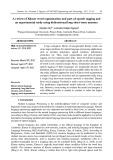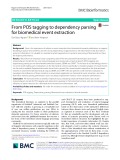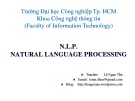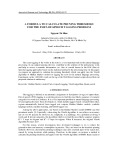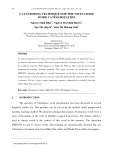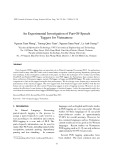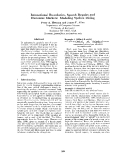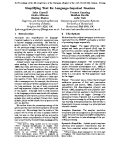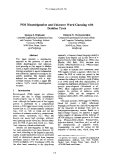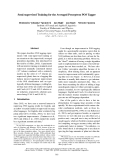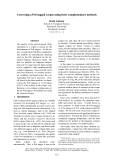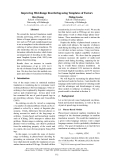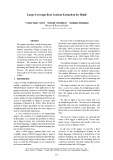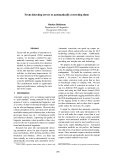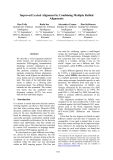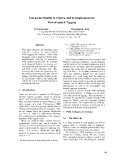
Pos tagging
-
This paper is structured as follows: literature reviews part, which discusses different methods and frameworks in recent research related to Khmer word segmentation and POS tagging, Bidirectional long short-term memory section, which describes the experiment of this study and result, and finally is future work section.
 12p
12p  vibego
vibego
 02-02-2024
02-02-2024
 4
4
 0
0
 Download
Download
-
Given the importance of relation or event extraction from biomedical research publications to support knowledge capture and synthesis, and the strong dependency of approaches to this information extraction task on syntactic information, it is valuable to understand which approaches to syntactic processing of biomedical text have the highest performance.
 13p
13p  vicoachella2711
vicoachella2711
 27-10-2020
27-10-2020
 9
9
 1
1
 Download
Download
-
Lecture “Natural language processing – Chapter 3: Basic principles for NLP” has contents: POS – part of speech tagging, POS – part of speech examples for English, POS – Methods of tagging, sentence types,…and other contents.
 28p
28p  dien_vi01
dien_vi01
 21-11-2018
21-11-2018
 26
26
 1
1
 Download
Download
-
One of crucial factors in the POS (Part-ofSpeech) tagging approaches based on the statistical method is the processing time. In this paper, we propose an approach to calculate the pruning threshold, which can apply into the Viterbi algorithm of Hidden Markov model for tagging the texts in the natural language processing. Experiment on the 1.000.000 words on the tag of the Wall Street Journal corpus showed that our proposed solution is satisfactory.
 10p
10p  cumeo3000
cumeo3000
 01-08-2018
01-08-2018
 27
27
 0
0
 Download
Download
-
A clustering technique for the Vietnamese word categorization. In natural language processing, part-of-speech (POS) tagging plays an important role, as its output is the input of many other tasks (syntax analysis, semantic analysis. . . ). One of the problems related to POS tagging is to define the POS set. This could be solved using unsupervised machine learning methods.
 12p
12p  lehasiphuong
lehasiphuong
 22-05-2018
22-05-2018
 36
36
 2
2
 Download
Download
-
Part-of-speech (POS) tagging plays an important role in Natural Language Processing (NLP). Its applications can be found in many other NLP tasks such as named entity recognition, syntactic parsing, dependency parsing and text chunking. In the investigation conducted in this paper, we utilize the techniques of two widely-used toolkits, ClearNLP and Stanford POS Tagger, and develop two new POS taggers for Vietnamese, then compare them to three well-known Vietnamese taggers, namely JVnTagger, vnTagger and RDRPOSTagger.
 15p
15p  truongtien_09
truongtien_09
 10-04-2018
10-04-2018
 32
32
 6
6
 Download
Download
-
To understand a speaker's turn of a conversation, one needs to segment it into intonational phrases, clean up any speech repairs that might have occurred, and identify discourse markers. In this paper, we argue that these problems must be resolved together, and that they must be resolved early in the processing stream. We put forward a statistical language model that resolves these problems, does POS tagging, and can be used as the language model of a speech recognizer.
 8p
8p  bunthai_1
bunthai_1
 06-05-2013
06-05-2013
 56
56
 5
5
 Download
Download
-
Concerning different approaches to automatic PoS tagging: EngCG-2, a constraintbased morphological tagger, is compared in a double-blind test with a state-of-the-art statistical tagger on a common disambiguation task using a common tag set. The experiments show that for the same amount of remaining ambiguity, the error rate of the statistical tagger is one order of magnitude greater than that of the rule-based one. The two related issues of priming effects compromising the results and disagreement between human annotators are also addressed. ...
 8p
8p  bunthai_1
bunthai_1
 06-05-2013
06-05-2013
 48
48
 3
3
 Download
Download
-
We download the original newspaper articles automatically from the WWW2, and apply a number of processing stages sequentially. Lexical Tagger The tagger (Elworthy, 1994) assigns and ranks part-of-speech (PoS) tags for each word in a sentence using a rst-order HMM. The tagger includes an unknown word guesser with an accuracy of around 85%, and a large diskresident lexicon specialised to newspaper text. Morphological Analyser The morphological analyser (an enhanced version of the GATE project lemmatiser (Cunningham et al.
 2p
2p  bunthai_1
bunthai_1
 06-05-2013
06-05-2013
 55
55
 3
3
 Download
Download
-
This paper presents a decision-tree approach to the problems of part-ofspeech disambiguation and unknown word guessing as they appear in Modem Greek, a highly inflectional language. The learning procedure is tag-set independent and reflects the linguistic reasoning on the specific problems. The decision trees induced are combined with a highcoverage lexicon to form a tagger that achieves 93,5% overall disambiguation accuracy.
 8p
8p  bunthai_1
bunthai_1
 06-05-2013
06-05-2013
 41
41
 3
3
 Download
Download
-
We present experiments with part-ofspeech tagging for Bulgarian, a Slavic language with rich inflectional and derivational morphology. Unlike most previous work, which has used a small number of grammatical categories, we work with 680 morpho-syntactic tags. We combine a large morphological lexicon with prior linguistic knowledge and guided learning from a POS-annotated corpus, achieving accuracy of 97.98%, which is a significant improvement over the state-of-the-art for Bulgarian.
 11p
11p  bunthai_1
bunthai_1
 06-05-2013
06-05-2013
 47
47
 3
3
 Download
Download
-
This paper describes POS tagging experiments with semi-supervised training as an extension to the (supervised) averaged perceptron algorithm, first introduced for this task by (Collins, 2002). Experiments with an iterative training on standard-sized supervised (manually annotated) dataset (106 tokens) combined with a relatively modest (in the order of 108 tokens) unsupervised (plain) data in a bagging-like fashion showed significant improvement of the POS classification task on typologically different languages, yielding better than state-of-the-art results for English and Czech (4.
 9p
9p  bunthai_1
bunthai_1
 06-05-2013
06-05-2013
 37
37
 1
1
 Download
Download
-
The quality of the part-of-speech (PoS) annotation in a corpus is crucial for the development of PoS taggers. In this paper, we experiment with three complementary methods for automatically detecting errors in the PoS annotation for the Icelandic Frequency Dictionary corpus. The first two methods are language independent and we argue that the third method can be adapted to other morphologically complex languages. Once possible errors have been detected, we examine each error candidate and hand-correct the corresponding PoS tag if necessary. ...
 9p
9p  bunthai_1
bunthai_1
 06-05-2013
06-05-2013
 56
56
 1
1
 Download
Download
-
We extend the factored translation model (Koehn and Hoang, 2007) to allow translations of longer phrases composed of factors such as POS and morphological tags to act as templates for the selection and reordering of surface phrase translation. We also reintroduce the use of alignment information within the decoder, which forms an integral part of decoding in the Alignment Template System (Och, 2002), into phrase-based decoding. Results show an increase in translation performance of up to 1.0% BLEU for out-of-domain French–English translation.
 8p
8p  bunthai_1
bunthai_1
 06-05-2013
06-05-2013
 49
49
 3
3
 Download
Download
-
This paper examines unsupervised approaches to part-of-speech (POS) tagging for morphologically-rich, resource-scarce languages, with an emphasis on Goldwater and Griffiths’s (2007) fully-Bayesian approach originally developed for English POS tagging. We argue that existing unsupervised POS taggers unrealistically assume as input a perfect POS lexicon, and consequently, we propose a weakly supervised fully-Bayesian approach to POS tagging, which relaxes the unrealistic assumption by automatically acquiring the lexicon from a small amount of POS-tagged data....
 9p
9p  bunthai_1
bunthai_1
 06-05-2013
06-05-2013
 55
55
 1
1
 Download
Download
-
Báo cáo khoa học: "TBL-Improved Non-Deterministic Segmentation and POS Tagging for a Chinese Parser"
Although a lot of progress has been made recently in word segmentation and POS tagging for Chinese, the output of current state-of-the-art systems is too inaccurate to allow for syntactic analysis based on it. We present an experiment in improving the output of an off-the-shelf module that performs segmentation and tagging, the tokenizer-tagger from Beijing University (PKU). Our approach is based on transformation-based learning (TBL).
 9p
9p  bunthai_1
bunthai_1
 06-05-2013
06-05-2013
 35
35
 2
2
 Download
Download
-
This paper describes a method using morphological rules and heuristics, for the automatic extraction of large-coverage lexicons of stems and root word-forms from a raw text corpus. We cast the problem of high-coverage lexicon extraction as one of stemming followed by root word-form selection. We examine the use of POS tagging to improve precision and recall of stemming and thereby the coverage of the lexicon. We present accuracy, precision and recall scores for the system on a Hindi corpus.
 9p
9p  bunthai_1
bunthai_1
 06-05-2013
06-05-2013
 38
38
 2
2
 Download
Download
-
Faced with the problem of annotation errors in part-of-speech (POS) annotated corpora, we develop a method for automatically correcting such errors. Building on top of a successful error detection method, we first try correcting a corpus using two off-the-shelf POS taggers, based on the idea that they enforce consistency; with this, we find some improvement. After some discussion of the tagging process, we alter the tagging model to better account for problematic tagging distinctions. This modification results in significantly improved performance, reducing the error rate of the corpus. ...
 8p
8p  bunthai_1
bunthai_1
 06-05-2013
06-05-2013
 45
45
 2
2
 Download
Download
-
We describe a word alignment platform which ensures text pre-processing (tokenization, POS-tagging, lemmatization, chunking, sentence alignment) as required by an accurate word alignment. The platform combines two different methods, producing distinct alignments. The basic word aligners are described in some details and are individually evaluated. The union of the individual alignments is subject to a filtering postprocessing phase. Two different filtering methods are also presented. The evaluation shows that the combined word alignment contains 10.
 8p
8p  bunthai_1
bunthai_1
 06-05-2013
06-05-2013
 50
50
 2
2
 Download
Download
-
This paper discusses the theoretical and practical concerns in part-of-speech (POS) tagging for Chinese. Unlike other languages such as English, Chinese lacks morphological marking in association with categorial alternations. We consider such categorial fluidity a continuum, and any categorial shift a transition, with special focus on the verb-noun shift.
 4p
4p  bunthai_1
bunthai_1
 06-05-2013
06-05-2013
 38
38
 2
2
 Download
Download
CHỦ ĐỀ BẠN MUỐN TÌM









